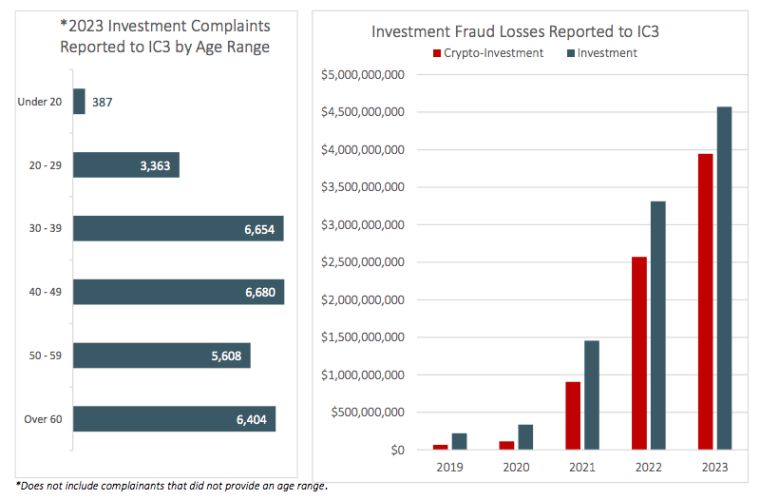A growing threat known as “pig butchering” is a new type of scam threatening millions of investors. This is a sophisticated type of fraud that has already siphoned billions of dollars from crypto enthusiasts globally and a new study has revealed the devastating effects that it has had on the victims.
A recent study from Professor John Griffin from the University of Texas revealed the massive scale of these scams, which have resulted in more than $75 billion stolen since January 2020.
The amount is surprising as it exceeds previous estimates by far and highlights the explosive growth that this type of cybercrime has experienced since the COVID-19 pandemic.
Griffin worked alongside a graduate student named Kevin Mei to gather information from over 4,000 victims and used on-chain tracking tools to see how the money flowed out of investors’ wallets and onto those operated by scammers.
“These are large criminal organized networks, and they’re operating largely unscathed,” Griffin noted in an interview. He added that a portion of this total could represent proceeds from other criminal activities as well.
How Pig-Butchering Scams Work
Pig butchering comes from the practice of fattening these animals before they are slaughtered. In the context of crypto scams, the term refers to criminals “fatting up” their victims before they steal money from them.
The typical “pig butchering” scam begins with an unsolicited message that appears to come from a wrong number. Scammers use this to prompt an initial interaction that leads to a friendly conversation.
With time, they attempt to build a closer relationship with their target. This phase can last weeks or even months.
Once trust is established, the scammer introduces a seemingly lucrative crypto investment opportunity. Victims are shown fake account information displaying positive results from crypto investments.
Some may even be allowed to withdraw small amounts to maintain the illusion of legitimacy. As the scam progresses, these bad actors pressure victims to invest higher sums. Once substantial funds have been transferred, the scammers vanish and leave victims with devastating losses.
The Human Cost of Pig Butchering Scams
The impact of these scams extends far beyond financial losses. Victims often lose their life savings and face devastating consequences on their personal and financial well-being. Erin West, a prosecutor in Santa Clara County, California, who has helped recover millions for victims, described pig butchering as “the most dramatically devastating type of crime I have seen in my 25-plus years as a prosecutor.”
West has encountered victims from all walks of life, emphasizing that “these scammers are going after anybody that has a smartphone, anybody that has any access to money.”
Griffin’s study also found that once scammers siphoned funds from their victims, they most often converted them into Tether, a popular stablecoin. Of the addresses touched by the criminals, 84% of the transaction volume was in Tether.
“In the old days, it would be extremely difficult to move that much cash through the financial system,” Griffin explained. “You’d have to go through banks and follow ‘know-your-customer’ procedures. Or you’d have to put cash in bags.”
The researchers also found that Binance was the most popular exchange for scammers to cash out their ill-gotten gains, even after the company’s recent legal troubles.
However, West commented that the crypto exchange founded by Changpeng Zhao has been more than happy to assist her in restituting customers’ losses. She claims to have helped 26 pig-butchering victims thus far and has recovered a total of $2.5 million for them.
“What we found was that Binance was happy to help us and happy to get that dirty money off their platform and get it back into the hands of the victim,” West highlighted.
Meanwhile, the Chief Executive Officer of Tether, the company that issues the popular stablecoin USDT, countered that his company works alongside law enforcement to trace the perpetrators of these and other types of crypto fraud.
“With Tether, every action is online, every action is traceable, every asset can be seized and every criminal can be caught,” he told Bloomberg News.
Law Enforcement Response
Authorities are increasingly aware of the threat posed by pig-butchering scams and are taking steps to combat them. Prosecutors, like Erin West, have successfully traced and recovered millions in stolen crypto funds.
West has trained over 1,600 law enforcement officers across the United States on how to help victims recover their money. Given the global nature of these scams, international law enforcement cooperation is crucial.
However, the decentralized nature of cryptocurrency and the international scope of these criminal networks pose significant challenges for law enforcement.
In a disturbing twist, many of the individuals carrying out these scams are themselves victims of human trafficking. The United Nations has estimated that more than 200,000 people are being held in scam compounds across Southeast Asia, forced to perpetrate these frauds under threat of violence.
These trafficking victims are often lured to countries like Cambodia and Myanmar with promises of high-paying jobs, only to find themselves trapped and coerced into scamming others.
How to Protect Yourself from These Scams?

As the threat of pig-butchering scams continues to grow, experts emphasize the importance of education and caution. Individuals are advised to proceed with extreme caution when they receive unsolicited investment offerings, especially from strangers online. It’s crucial never to send money to someone you haven’t met in person.
Experts also stress the importance of being skeptical of promises of guaranteed high returns. Consulting with trusted family members or financial advisors before making large investments is highly recommended as they can bring an objective perspective to the matter. Finally, legitimate investments rarely require urgent action, so pressure to act quickly should be seen as a red flag.
Jason Wray, a victim who lost money to a crypto scam, offered this worthy piece of advice: “If it’s too good to be true, it is. I am not saying ‘it probably is’ anymore. If it’s too good to be true, it is.”
Pig-butchering scams represent a growing and sophisticated threat in the world of cryptocurrency investment. With billions of dollars stolen and countless lives impacted, these scams highlight the dark side of digital assets and the need for increased vigilance, education, and action from law enforcement agencies.
As cryptocurrency continues to evolve, so too must investors’ defenses against those who are intentionally exploiting unwary investors within this space.
The scale and sophistication of these scams emphasize the urgent need for improved regulation and oversight in the cryptocurrency space. As digital assets become increasingly mainstream, it’s crucial that investors, financial institutions, and regulators work together to develop more robust safeguards against fraud.
Moreover, the connection between pig-butchering scams and human trafficking adds another layer of urgency to address this issue. It’s not just about protecting investors’ money; it’s also about combating a form of modern slavery that exploits vulnerable individuals and forces them to perpetrate these crimes.
